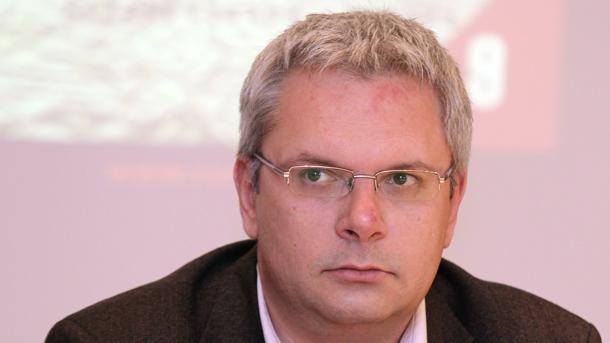February 1, the Day of Remembrance and Respect to Victims of the Communist Regime was first marked in 2011. This date is not a coincidence – on 1 February 1945 the so-called People’s Court, created after the establishment of the communist regime in Bulgaria spotted its history with the greatest number of death sentences ever proclaimed over politicians. MPs, premiers and ministers, the regents of minor Tsar Simeon II, publishers and writers, journalists, generals and colonels were sentenced to death. The repressive tool of State Security is also a part of that past and 26 years after the political changes Bulgaria is still in the beginning of its research. Two of this process’ pioneers are journalist Maria Dermendjieva and historian Momchil Metodiev. Their book, named State Security – Hereditary Privilege, surveying the professional biographies of some of its leading officers, has been recently released.
It turns out that the professional CVs of 47 heads of the former State Security might reconstruct the way the so-called transition period was staged, as Bulgaria’s failures are often explained with the old dependencies and connections. The book’s coming out 26 years after the changes of the political system is not all that late considering the Bulgarian situation, Maria Dermendjieva explains and adds:
“ Keeping in mind that the files of the State Security were opened 17 years after the start of transition, it is not a surprise,” she comments. “The civil energy and initiative was aimed at politics after the first democratic polls and the political initiative on the files’ opening remained with the communists. Those had no interest to do it, but succeeded in imposing thousand myths on State Security and its officers. However, the serious opening of the files begins to refute the lies that those used to be patriots, defending this country’s interests etc.”
Keeping in mind that the files of the State Security were opened 17 years after the start of transition, it is not a surprise,” she comments. “The civil energy and initiative was aimed at politics after the first democratic polls and the political initiative on the files’ opening remained with the communists. Those had no interest to do it, but succeeded in imposing thousand myths on State Security and its officers. However, the serious opening of the files begins to refute the lies that those used to be patriots, defending this country’s interests etc.”
Historian Momchil Metodiev talks on the fact that Bulgaria’s transition didn’t start with the opening, research and comprehension of the repressive tool of State Security’s files.
 “I am only proud of the fact that an ethnic clash was avoided,” he says and adds: “The forceful change of the Bulgarian Turks’ names happened in the late 1980s and in 1990 western observers expected yet another Yugoslavian scenario here. That was how the files’ opening remained second even for the leaders of the so-called anti-communist opposition. If those files had been opened in 1990, Bulgaria’s history would have looked differently, simply because what’s today the “elite” – linked to the old one, wouldn’t have organized and imposed itself, influencing and manipulating the public opinion.”
“I am only proud of the fact that an ethnic clash was avoided,” he says and adds: “The forceful change of the Bulgarian Turks’ names happened in the late 1980s and in 1990 western observers expected yet another Yugoslavian scenario here. That was how the files’ opening remained second even for the leaders of the so-called anti-communist opposition. If those files had been opened in 1990, Bulgaria’s history would have looked differently, simply because what’s today the “elite” – linked to the old one, wouldn’t have organized and imposed itself, influencing and manipulating the public opinion.”
According to the historian, the delayed opening of the files allowed the preservation of old dependencies, as the chance for comprehension of the close past was missed. Thus Bulgaria lost important years, regarding its democratic development. Ignorance and cynicism took over the society.
“This is the strongest characteristics of State Security,” the historian says. “Our thesis is that this whole thing spread over other public sectors after 1990, as the former state security officers took their opportunity to influence private business. Hence the current tension between these privileged people and the normal middle class that consists of self-made persons.”
Fired officers went into private business after 1990, keeping all their contacts. Due to the failed opening of the files those connections spread across all public sectors, resulting in the creation of political and economic elite that parasitizes on the state. “An example of that phenomenon is the postponing of the privatization process till end-1990s, when this elite had already accumulated wealth and influence,” Mr. Metodiev explains and Mrs. Dermendzhieva adds in her turn:
“These connections remain behind the stage and are carefully guarded by the contemporary services. Thus this symbiosis was created between private business and state bodies. The secrecy of these connections, due to the closed files, has created a feeling among common people that it is a wall they cannot break through, simply because they are not of the right kind.”
English version: Zhivko Stanchev
Before leaving this world, Pope Francis chose "Migrants, missionaries of hope" to be the theme of this year's World Day of Migrants and Refugees, which the Catholic Church marks on 4-5 October 2025 . "With these words,..
In Argentine Patagonia, the city of Comodoro Rivadavia preserves the history of Bulgarian settlers, whose descendants still carry Bulgaria in their hearts today. Among them is Tzenka Guenova, who was born in Troyan, but arrived in..
Since 1980, 27 September has been celebrated globally as World Tourism Day, marking the anniversary of the adoption of the UN World Tourism Organization’s charter in 1970. Across Bulgaria, towns and villages host special events, although the local..

+359 2 9336 661
